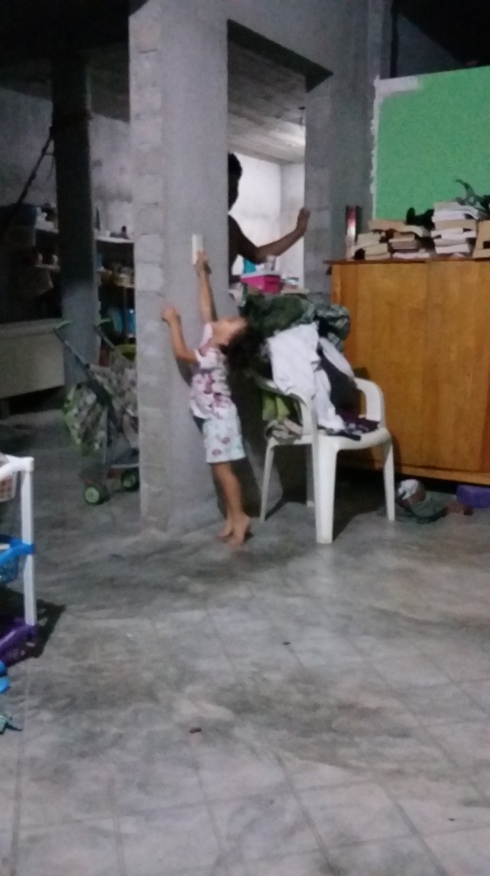Imagine: I’m sitting in my office wearing a stretchy tube top with holes cut over the nipples. There’s a knock on my closed and locked door. I sit silently, resisting both the normal urge to say, “Come in!” and the other urge to say “Go away! I’m busy!” Instead I pretend I’m not there, holding my breath, even though the whoop-whoop of the breast pump is much louder than my breathing, and I’m not sure if they can hear the machine out there or not. I feel sheepish and illicit somehow, and frustrated that I might be ignoring some student in need of help. There are no official rules that I know of about pumping while at work. I haven’t asked about it, either, just in case I get any grief. As far as I know, I’m the only one at work who does it. It’s not what I’d rather be doing, but it’s what I am doing, so that’s that. Everything’s a tradeoff.
I have a love / hate relationship with my breast pump. As I mentioned last week, most people in my state have no idea that breast pumps exist. Considering that, it’s pretty much a miracle that so far I’m pulling off this daunting feat of working full time and feeding Khalil only with breast milk. So on one hand, I’m surprised, pleased, and amazed every day that passes in which I don’t have to buy formula. I’m incredibly grateful to live in this moment in history when the technology exists to do such a crazy thing. I’m even more grateful to have access to these tools (especially my fancy electrical breast pump, which you can’t buy around here) and to have a work life / schedule that allow me to do this.
On the other hand, I despise the fact that I’m a slave to more chores- all this washing bottles and pump parts. I hate the inefficiency of it- all this time to extract and store and reheat when putting the baby to the breast is so wham, bam, thank-you-ma’am. Not to mention that a machine is never gonna get ‘er done like a crying, smiling, hormone-inducing baby. Plus when you are acutely aware of every drop coming (or not coming) out, you get to fret over whether you’re getting enough milk out, as if you needed an extra worry in your life.
And it is stressful. My rigged-up hands-free pumping situation helps me get work done while pumping, but all the set-up and clean-up still take some time out of my workday. I suspect I make up for it since I don’t spend nearly the time I used to responding to emails and checking the news on NPR and such, but nonetheless, sometimes I’m just barely caught up on work instead of the “ahead of the game” that I prefer. Okay, I can live with that.
The stress over milk production is something else, though. With Lucia, and before I went back to work with Khalil, I had what you call an “oversupply” of milk- more than even my chubby little baby needs. When I first went back to work I was pumping about 15 ounces or more a day without even blinking. But pumps can’t do exactly what babies can, and my pumping ability has dwindled and dwindled to some days as little as 5 or 6 ounces. I’ve added in an extra morning session, even on the weekends, which I thought was going to be a horrendous burden. But I’ve gotten used to it. I still stress about how much is coming out, whether it’s enough, and I hate knowing that this is only a problem because I can’t just let my baby nurse whenever he wants. I’d still rather be sleeping or exercising instead of pumping first thing in the morning while Khalil’s still asleep. I’d rather be nursing than working and pumping pretty much everytime I pick up the pump. But I’m doing it. I’m pulling it off, and I’m grateful.
Beforehand, going back to work and pumping was terrifying. It was unchartered territory for me, so the dread of all the unknowns was much worse than the reality. When Lucia was a baby, I had the great privilege / misery of not working outside the home until she was over a year old. It was both joyful and abysmal, because changing diapers and cooing and doing housework all day every day was stressful, rewarding and terribly mind numbing all at once for me. But one of the biggest perks was that it made breastfeeding super easy and convenient. Breastfeeding was something I wanted to do and that I enjoyed (at least the whole first year), so it was a pretty big perk. I loved that there was nothing extra to pack when I went out (besides diapers, of course), no bottles to wash. I was lucky to have lots of good help in learning to nurse when Lucia was a newborn, and to have copious amounts of milk for my fat and happy infant. It was semi-bliss.
Except, of course, when I wanted to go out without the baby. Or have more than 2 drinks (yes, 2 alcoholic beverages is acceptable! A lifeline for relaxing!) If I wanted more than an hour’s freedom from baby, I was S.O.L. Lucia would have preferred to starve rather than take a bottle, even of my milk. It was our fault, granted. We’d given her a couple bottles of pumped milk just before leaving the US, which she’d taken just fine at 6 weeks old. But then I wasn’t very motivated to pump after we moved to Mexico (is anyone excited about pumping? I bet not), so we ended up not trying to give her a bottle again until she was several months old, by which point she wasn’t having any of it. Oops.
For the most part, though, I enjoyed that bond with Lucia and wanted the same with Khalil. But going back to work was a must, so here I am. Now I’d like to state for the record that I am not a formula-hater, and certainly not a mama-hater. I breastfeed because I want to and I’m able to, period. I’m not at all interested in judging anybody else’s reasons or decisions about how they feeding their babies. But because I want to breastfeed and work, I have to accept the tradeoffs. I gotta get intimate with my breast pump several times a day. I gotta spend some at-home time with the pump, too. The plus side is that I can go out without Khalil sometimes, which I couldn’t do with Lucia, and I still haven’t had to buy formula. Like everything about parenting, there’s an upside and a downside, all the damn time. There’s no perfect world or any perfection at all when it comes to this parenting business (and this whole being human business). So I’ll take my tradeoffs and accept the perfect imperfection of my situation and the wondrous, maddening adventure that is motherhood.







